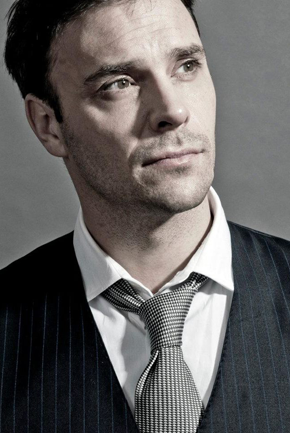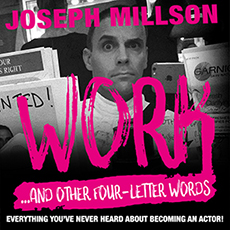The RSC website has updated the page for The Rover with this new photo of Joseph as Willmore. The Rover opens on September 8th.
Passion. Heat. Sex… Amid the fast and furious world of the South American carnival, three wandering cavaliers roam in exile whilst three women looking for love and fighting for a little freedom explore this vibrant, frenzied, dizzying world. Join us in the Swan Theatre for a fusion of sights and sounds, whirling music, cultural tension, dubious romance and dilapidated beauty. Aphra Behn was England’s first female professional playwright and a strong voice in early feminism. Loveday Ingram (The Merchant of Venice, 2001) returns to direct this masterpiece of Restoration comedy, joining forces with Olivier and Tony Award-winning designer Lez Brotherston.
An new interview with director Loveday Ingram and Alexandra Gilbreath has been shared on this website. The interview gives a great background to author Aphra Behn and the play itself.
The rover of her most famous play's title refers to a wandering naval captain called Willmore, enjoying a hedonistic break at the Neapolitan Carnival. There, he becomes embroiled in a complicated love triangle with a young woman called Hellena, looking to gain worldly experience before her brother sends her to a convent, and the famous courtesan, Angellica Bianca, played in this production by RSC Associate Artist Alexandra Gilbreath.
“Angellica is a very high-class courtesan who has previously been the mistress of a Spanish general who passed away a number of years ago, so she's on the look-out for another wealthy benefactor. Hers is a very sad story: she really falls in love with the rover and it's like an awakening for her, even though he's very much a 'wherever I lay my hat' sort of character. Since we've been rehearsing it, I've been surprised by its emotional depth - it's like doing Rattigan. There's a moment in one scene where she's almost like Hester in The Deep Blue Sea - she's in love with someone who can't possibly love her back in the same way.”
Though the play is superficially a comedy, there's a troubling undercurrent running through it that’s already surfaced in the rehearsal process.
“I've tried to bring a sense of the Restoration world the play is set in to the rehearsal room. We were working on one of the final scenes of the play last week where Florinda, one of the sisters, finds herself in a very awkward situation with a group of men who are drunk and a little out of control. They start drawing lots to see who wins her, and her brother does. We stopped the rehearsal at that point, thinking it was going somewhere very dark and that couldn't be what was intended, but I got out Samuel Pepys' diary, and read some of the poems and articles that were written around the time, and straight away you see that this really is the world you're dealing with - it's really filthy and quite shocking in its treatment of women.”










Recent comments